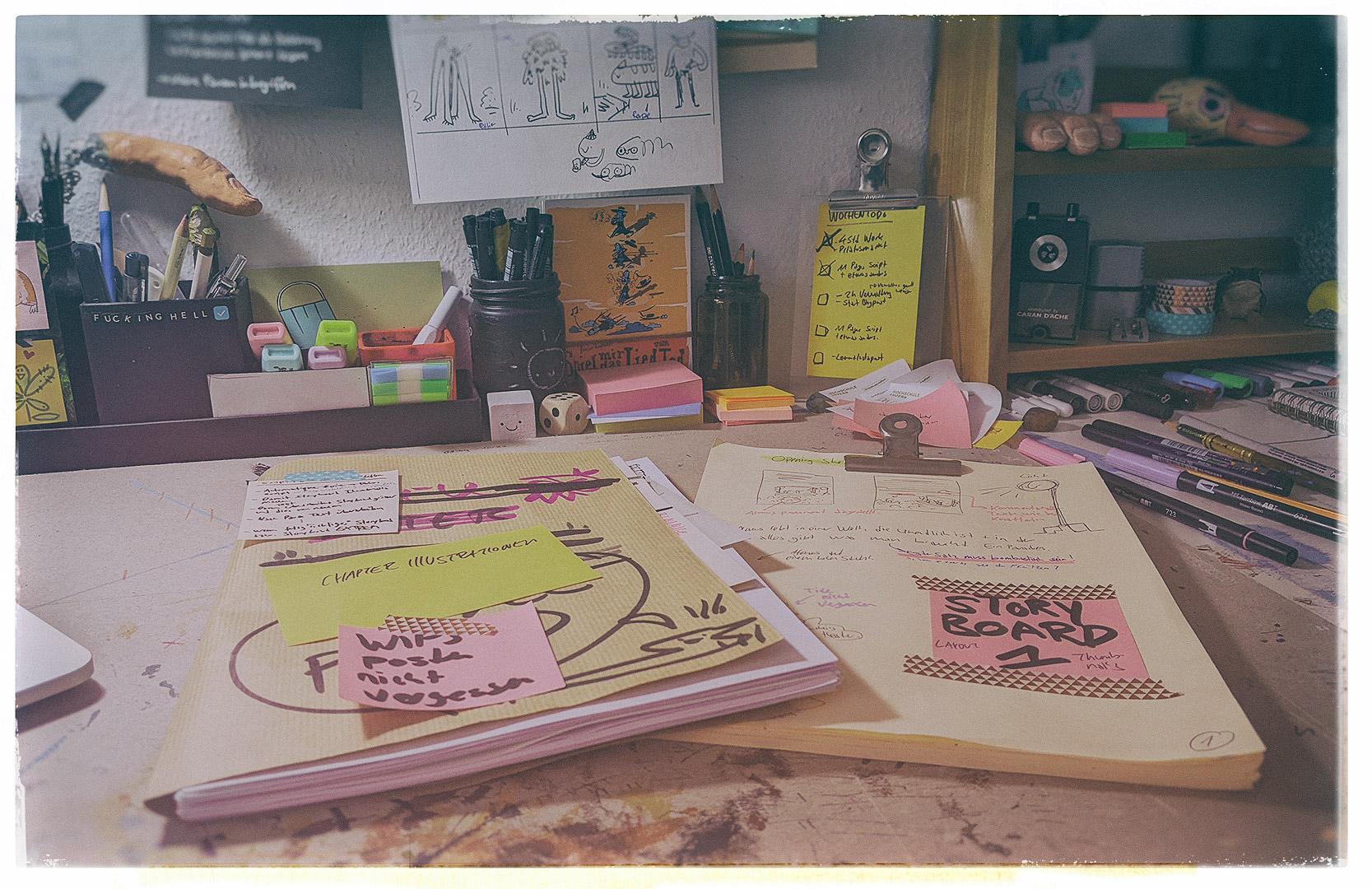
My client work has slowed down a bit this first half of the year. While this is bad for my bank account, it is quite good for my long-term projects. As mentioned in my blog post about big projects, I’m working on a graphic novel. The first (crappy) layout has already been viewed and heavily judged by people, and now I’m already working on the second layout version. Hopefully a less crappy one.
Another project is a webcomic I’m preparing. It’s actually the third webcomic idea I’ve had (the second one became the graphic novel I’m working on), but I’m pretty confident about this version. It has everything: Wacky characters, a silly story, and memes! I won’t go into too much detail for now (stay tuned), but I wanted to talk to you about working on these big projects and the ups and downs that such projects can have. Especially overcoming the downs that you will face as you work on them.
We always see the finished work of creatives. Big projects like paintings, books and movies, and other works. But I think it is important to see the less positive side of these beautiful works. So I’m here to share my personal experiences and insights.
Overcoming Challenges and Finding Solutions
While it’s all fun and games in the beginning, and we’re fueled by motivation and inspiration, as soon as we hit roadblocks (or the realization that this is a lot of work), we get into some trouble. Over time, this can lead to the project being abandoned, but it is important to fight through these hard times.
When faced with these challenges, I realized the importance of seeking support and advice from friends and fellow creatives. Talk to them about your project. It will lead to more (and better) ideas for continuing the project, and the people you talk to can motivate you to keep going. Often a pep talk happens automatically when you discuss your project. Your listeners get excited about your ideas and what you have planned, and this will infect you and push you on when your motivation is low.
In addition, breaking the project down into smaller, more manageable tasks helped me face these big projects with seemingly no light at the end of the tunnel. By focusing on one step at a time, I was able to make progress, even when it was slow. Leverage digital tools for this purpose: I use a project management system with Notion to break down these big projects into smaller pieces.
Another valuable lesson I learned from these projects was the power of experimentation and embracing failure. Instead of being discouraged by setbacks, I saw them as learning opportunities. The more we fail, the better we become. I discovered new ideas by iterating, exploring different approaches, and allowing myself to make mistakes.
Take Time and Push Through Big Projects
While working on my graphic novel, I faced unforeseen difficulties and moments of self-doubt. I realized that I needed more revisions of my layout, which pushed back my estimated time frame for completion of the project. To stay motivated in those moments, I tried to remind myself that it was perfectly fine to take the time I needed to make the graphic novel as good as possible (not perfect, of course). As long as I keep working on it, I will finish it. Even if it takes me a year longer than I thought it would.
I also take breaks that allow me to recharge and return to the project with renewed energy and focus. In my case, it is also good to find flaws in the visuals and story of my graphic novel and my webcomic. After a break of a few weeks, you can read your script as if you had never written it. You will see if your dialog feels natural or not. Just don’t take a break for too long. A long break will quickly turn into an abandoned project.
Finally, I developed a routine of regular reflection and self-evaluation that helped me push through lows. By evaluating my progress, identifying areas for improvement, and reaffirming my commitment to the project, I could push through moments of doubt and stay committed. Until I finish this behemoth of a project.
Conclusion
In summary, you need to overcome challenges by seeking support from others and breaking tasks into smaller parts. Accept failure and take the time necessary to complete your project. Engage in self-reflection so that you know where you are going. It is essential that you remain persistent and committed in the face of difficulties. Then you will be able to complete your big projects.
By sharing my experiences, I hope to inspire others to take on ambitious projects, understanding that the journey and personal growth are just as important as the finished product. After all, you probably won’t like the finished projects anyway when you’re done.
